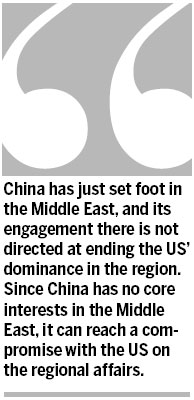China has role to play in Mideast
Updated: 2013-01-08 07:56
By Hua Liming (China Daily)
|
||||||||

Several major factors will affect the situation in the Middle East in the next decade. First is the eastward shift of the United States' strategic focus.
After World War II, the US invested its strategic resources heavily in the Middle East to maintain its dominant position in the region. But the shift of the world's economic and political focus to the Asia-Pacific region at the beginning of the 21st century, combined with the wars in Iraq and Afghanistan and the global financial crisis, forced Washington to change its global strategy. So it shifted its strategic focus to Asia-Pacific and curtailed its investment in the Middle East.
On assuming office in 2009, US President Barack Obama spelled out his Middle East goals as withdrawing troops from Iraq and Afghanistan, finding ways to resolve the Israeli-Palestinian conflict and devising a strategy to check Iran's nuclear ambitions.
The US is now trying to rebuild its soft power and image in the Middle East through "smart diplomacy" rather than the conventional high-investment, high-risk and high-return policy. But the Middle East is a region where multiple powers have scrambled for supremacy since ancient times.
The second factor that will influence the Middle East is the changing global energy pattern. Along with the "shale gas" revolution, the US is slowly becoming the world's major energy supplier. While the Americans are complacent about achieving "energy independence", the oil trade pattern in the Middle East is becoming distorted. Middle East countries export most of their oil and gas to and import a lot of their goods from their East Asian counterparts, and the US is becoming increasingly powerless in providing military and security guarantee in the Middle East, which could challenge the hegemony of the petrodollar.
The third factor is the transformation of the Middle East countries. The old political system in the region is breaking down, while establishing a new order is proving to be increasingly difficult. Therefore, the region's countries face a long transition, full of difficulties and reverses, during which much will depend on whether the new governments can put in place the material foundation for national development and thus achieve a power balance.

 Li Na on Time cover, makes influential 100 list
Li Na on Time cover, makes influential 100 list
 FBI releases photos of 2 Boston bombings suspects
FBI releases photos of 2 Boston bombings suspects
 World's wackiest hairstyles
World's wackiest hairstyles
 Sandstorms strike Northwest China
Sandstorms strike Northwest China
 Never-seen photos of Madonna on display
Never-seen photos of Madonna on display
 H7N9 outbreak linked to waterfowl migration
H7N9 outbreak linked to waterfowl migration
 Dozens feared dead in Texas plant blast
Dozens feared dead in Texas plant blast
 Venezuelan court rules out manual votes counting
Venezuelan court rules out manual votes counting
Most Viewed
Editor's Picks

|

|

|

|

|

|
Today's Top News
Boston bombing suspect reported cornered on boat
7.0-magnitude quake hits Sichuan
Cross-talk artist helps to spread the word
'Green' awareness levels drop in Beijing
Palace Museum spruces up
First couple on Time's list of most influential
H7N9 flu transmission studied
Trading channels 'need to broaden'
US Weekly

|

|







